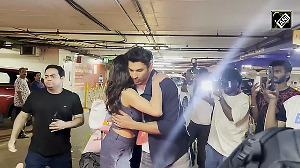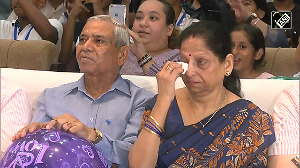Controversial Indian-origin writer Salman Rushdie has said that he pretended to 'embrace Islam', the religion of his birth, almost 18 years ago in the hope that it would lessen the threat to kill him.
In an interview to be broadcast on a television programme Shrink Rap on channel More4 in May, Rushdie claimed his reversion to the religion of his birth was all 'pretence'.
'It was deranged thinking. I was more off-balance than I ever had been, but you can't imagine the pressure I was under. I simply thought I was making a statement of fellowship. As soon as I said it, I felt as if I had ripped my own tongue out,' he was quoted having told to the programme by The Sunday Times.
In 1990, Rushdie had issued a statement in order to defuse the row about his novel The Satanic Verses, which was published two years from then and had provoked Muslims across the world.
The author had claimed that he had renewed his Muslim faith, had repudiated the attacks on Islam in his novel and was committed to working for better understanding of the religion across the world.
'It became the moment I hit rock bottom. I realised that my only survival mechanism was my own integrity. People, my friends, were angry with me, and that was the reaction I cared about,' the author said in the interview.
Born a Shi'ite Muslim in Mumbai, Rushdie never considered himself religious.
The Satanic Verses, considered blasphemous by many Muslims, was banned in India and burnt in demonstrations in the UK.
In 1989, Iran religious leader Ayatollah Khomeini had even put a bounty on Rushdie's head and the author was forced to go into hiding.
Rushdie claimed that the criticism of the book made him more upset than the fatwa.
'I had spent five years writing this book. It was my best effort. To have it hated and dismissed, and for me to be considered a person of no worth and value, was terrible. I thought that if this is what you get, then why write? I might as well become a bus conductor,' he said.
Rushdie virtually broke down in tears recalling the reaction to his first public reading of Midnight's Children -- the book that got him Booker's prize in 1981 -- organised by the magazine Granta in Cambridge.
'The room was full of Indians from the university and the town. After I finished reading, one woman got up and said: Thank you so much Mr Rushdie, you have told my story.'





